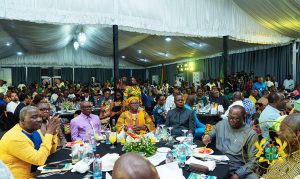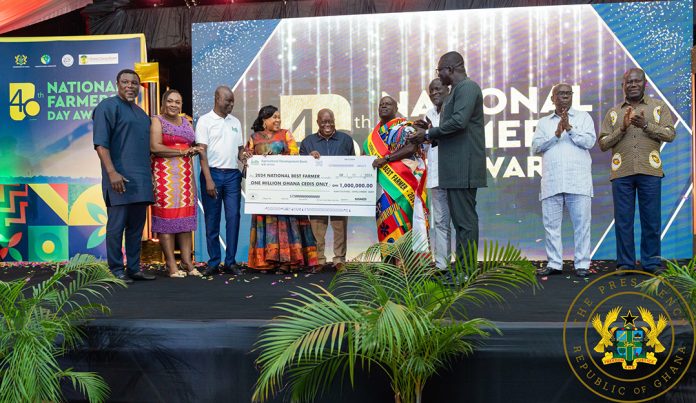The President, Nana Addo Dankwa Akufo-Addo has announced an increment in the producer price of cocoa and a free tertiary education for children of cocoa farmers.
The announcement was made at the 40th National Farmers’ Day celebration dinner held in Accra on Friday, November 8, 2024.
The new producer price for a tonne of cocoa has been pegged at GH¢49,600 per tonne, up from GH¢48,000 or from GH¢3,000 to GH¢3,100 per bag.

The President told the gathering of farmers and stakeholders in the Agric sector that the upward adjustment follows his instruction to the Ghana Cocoa Board to regularly assess the market conditions to reflect the income of cocoa farmers.
Explaining the rationale behind the free tertiary education directive for children of cocoa farmers, President Akufo-Addo said the successful implementation of the free Senior High School policy has rendered the COCOBOD scholarship moot.
Though children of cocoa farmers enjoyed free secondary education through COCOBOD’s scholarship, that is no longer needed because of the free SHS, thus channelling it to the tertiary level.
“I have a final statement to make to our cocoa farmers. On the advice of the Producer Price Review Committee, I announce an increase of the producer price of cocoa from GH¢48,000 to GH¢49,600 per tonne, or from GH¢3,000 per bag to GH¢3,100 per bag.
“This is a result of my instructions to the Minister to ensure that as the market changes, there are periodic reviews to restore farmer incomes,” the President stated.
He continued that “Furthermore, the COCOBOD and its scholarships, as we know it, was a source of relief for many parents in paying their ward’s fees. With the implementation of the free SHS policy, the objective has become moot.
“Today, I’ve directed COCOBOD to provide scholarships to every cocoa farmer’s child at the tertiary level. This means that all wards of cocoa farmers qualify for free tertiary education through the cocoa scholarship.”
AGRIC GROWTH
President Akufo-Addo, who gave his last farmers day address, outlined the achievements of his government between 2017 and 2023. He mentioned the impact of the Planting for Food and Jobs.
He said that within that period, Ghana’s agricultural GDP growth rate rose “significantly” from 2.7 percent to an average of 5.7 percent.
He added that the production of stable crops such as cereals, legumes and tubers saw ‘remarkable’ growth, increasing by more than 100 percent, 68 percent and 59 percent respectively.
He remarked that, “the increased output has brought us closer to food self-sufficiency, particularly in crops such as maize, cassava, and plantains.
“Furthermore, the value of our non-traditional agricultural exports grew from US$371 million in 2016 to US$519 million in 2022, underscoring Ghana’s growing influence in the global agricultural market. Our efforts have also been recognised internationally.”
AQUACULTURE
President Akufo-Addo also outlined what he described as bold steps his administration has taken, ostensibly to transform Ghana’s fisheries sector.
In July, this year, he launched the Aquaculture for Food and Jobs programme designed to increase domestic fish production, reduce dependence on imports and create employment for some 50,000 youth and women across the country.
He also commissioned state-of-the-art fishing harbours in Elmina and Jamestown to enhance fish handling and storage capacities and boost local economies.
SOIL
In order to promote practices like crop rotation, cover cropping and organic amendments, President Akufo-Addo said that his government had introduced soil management programmes that emphasise organic practices, soil testing and sustainable fertilisation methods.
By so doing, he said the government was helping farmers to rejuvenate their soil and reduce dependency on chemical fertilisers.









